Posts by Christopher Lochhead
320 How To Confront Evil & Inspire The World with Pastor Evan Mawarire of Zimbabwe
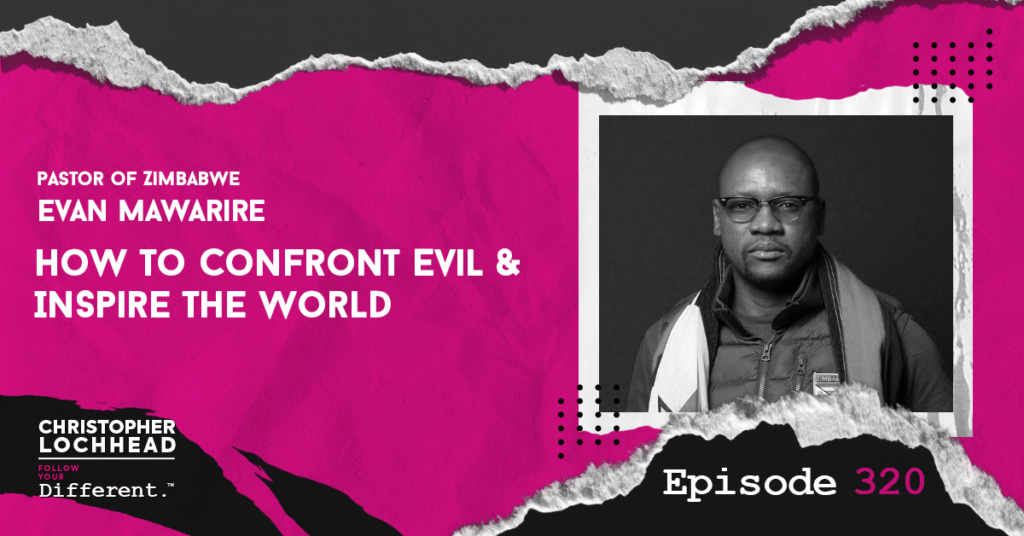
Podcast: Play in new window | Download (Duration: 2:17:24 — 94.3MB) | Embed
Subscribe: Apple Podcasts | Spotify | Pandora | RSS | More
There are experiences in life over which you never get in this, and dialogue is one of those. Normally, we tell you some things you’ll learn and some things to listen for, but not today – because we want you to get what there is for you to get from this conversation with our guest, Evan Mawarire.
Evan Mawarire is a Zimbabwean clergyman who founded the #ThisFlag Citizens Movement to challenge corruption, injustice, and poverty in Zimbabwe. He’s the man who stood up to an evil dictator Robert Mugabe of Zimbabwe, with nothing more than his voice, faith, and commitment to his country and his people.
Pastor Evan mobilized a movement powered by social media and empowered the nation of Zimbabwe to peaceful protest. And when he inspired his beloved country, Pastor Evan inspired the world, but he has paid in unimaginable personal price. On this episode, you get to hear his story in his words like never before.
You’re listening to Christopher Lochhead: Follow Your Different. We are the real dialogue podcast for people with a different mind. So get your mind in a different place, and hey ho, let’s go.
Pastor Evan Mawarire on releasing the bitterness
In this conversation, Pastor Evan Mawarire is asked how he maintains a positive attitude in the face of mistreatment and hardships.
Pastor Evan admits to having felt bitterness and anger along the way, but emphasizes the importance of releasing these emotions and practicing forgiveness. Holding on to bitterness, he believes, only poisons oneself and prevents personal growth. By forgiving others and asking for forgiveness for his own mistakes,
“I would be lying if I said I was never bitter or never angry at some point in my life, or in my journey, particularly this part of the journey. But you have to have an openness of heart to work that bitterness out. You have to have it in your hearts to be able to get to a point where you release the anger that you feel towards somebody because these are human emotions. At the end of the day, what bitterness does is that it does not affect what you are bitter towards, but it poisons your own well.”
– Pastor Evan Mawarire
Pastor Evan strives to be negative-free and to cultivate a clear conscience. He admits that this process is ongoing and affects all aspects of his life, including apologizing to his six-year-old daughter for his errors. Pastor Evan sees forgiveness as an essential part of his path, allowing him to thrive and be the best version of himself despite the risks and challenges that come with it.
You can Forgive and still seek Justice
Pastor Evan Mawarire is then asked how he can forgive those who have committed grave injustices against him and others, given the dangers he has faced.
Pastor Evan explains that forgiveness is not a substitute for justice and emphasizes the significance of distinguishing between the two. He recognizes the importance of justice and understands that forgiving someone does not absolve them of their actions.
While he has personally forgiven individuals such as Zimbabwean dictator Robert Mugabe, who threatened and mistreated him, Pastor Evan believes that justice must be sought for the crimes committed, not just for his own sake, but also for the millions of others who have suffered. He encourages others to forgive at their own pace, because true forgiveness comes from the heart and cannot be forced.


Finally, he emphasizes that forgiveness and the demand for justice can coexist because forgiveness is a personal choice and justice must still be sought.
Pastor Evan Mawarire on the Liberation Struggle of Zimbabwe
Pastor Evan then shares his background and the values instilled in him by his father.
He describes how his father, who had humble beginnings as a cow herder in rural Zimbabwe, actively participated in the liberation struggle for Zimbabwe’s independence. When the war ended in 1980, his father, along with his newlywed mother, moved to the capital city, with dreams and hopes for a prosperous new Zimbabwe.
Pastor Evan explains that he grew up witnessing his parents’ hard work, respect for others, and belief in the importance of helping people.
“I think the one thing I recognized growing up watching my mom and dad is this idea that you can, through hard work, through respect for other people, and through digging into yourself and figuring out what you’re good at, you can you can really build a life. But the most important thing my dad taught me – even growing up as a young man – is that a life that is lived only for one self, is a life that’s wasted.”
– Pastor Evan Mawarire
Following his father’s teachings, Pastor Evan chose not to pursue college but rather attended a technical school to learn a craft, becoming an auto electrician.
To hear more from Pastor Evan Mawarire and on how to inspire the world, download and listen to this episode.
Bio
Evan Mawarire is a Zimbabwean clergyman who founded #ThisFlag Citizen’s Movement to challenge corruption, injustice, and poverty in Zimbabwe.
The movement empowers citizens to hold government to account. Through viral videos, the movement has organized multiple successful non-violent protests in response to unjust government policy.
Pastor Evan was imprisoned in 2016, 2017, and 2019 for charges of treason, facing 80 years in prison.

His message of inspiring positive social change and national pride has resonated with diverse groups of citizens and attracted international attention.
Pastor Evan has addressed audiences around the world, and Foreign Policy magazine named him one of the 100 global thinkers of 2016.
The Daily Maverick Newspaper of South Africa named him 2016 African person of the year.
Evan is a 2018 Stanford University Fellow of the Centre for Democracy Development and the Rule of Law.
Links
Connect with Pastor Evan Mawarire!
Renew Democracy Initiative | Twitter | Instagram | Facebook
More information about Pastor Evan Mawarire
2022/23 SNF Agora Institute Johns Hopkins University Visiting Fellow
2022 National Endowment for Democracy Regan Fascell Fellow
2020 Yale University World Fellow
Yale International Leadership Centre advisory council member
We hope you enjoyed this episode of Christopher Lochhead: Follow Your Different™! Christopher loves hearing from his listeners. Feel free to email him, connect on Facebook, Twitter, Instagram, and subscribe on iTunes!
177 Should My Category Name Be Relevant And Relatable? | Pirates Perspective
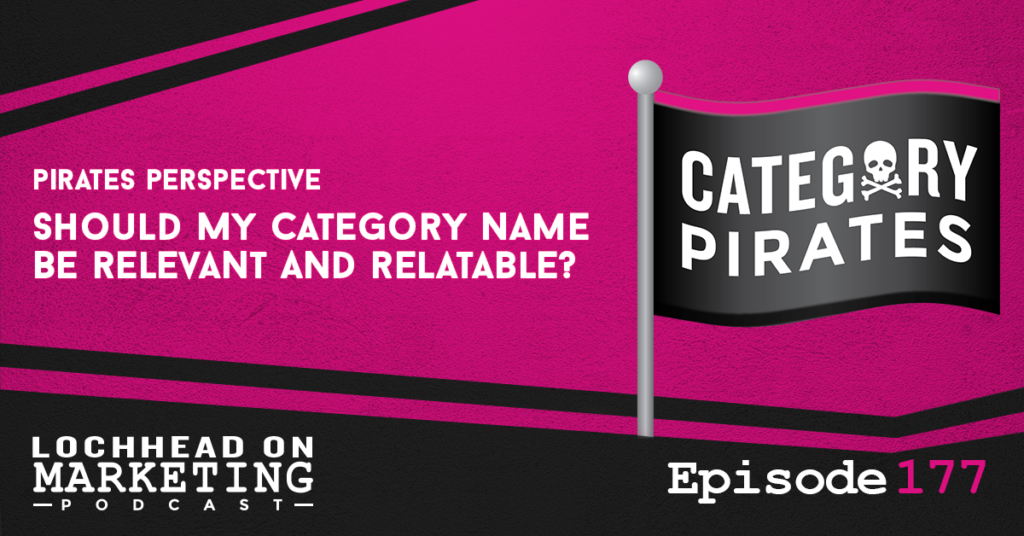
Podcast (lochheadonmarketing): Play in new window | Download (Duration: 9:40 — 6.6MB) | Embed
Subscribe: Apple Podcasts | Spotify | RSS | More
On this episode, we are presenting some Pirates Perspective from our newsletter, Category Pirates.
Eddie Yoon and Christopher Lochhead of Category Pirates answer questions about how important it is to create a category name that resonates with people—and that is similar enough to everyday language. Languaging takes thinking, but it’s worth getting right.
Welcome to Lochhead on Marketing. The number one charting marketing podcast for marketers, category designers, and entrepreneurs with a different mind.
The importance of a Category Name entering the mainstream
The first topic comes from a question about the importance of having a category name, and how important it is to be relevant enough to be used in everyday speech and lingo.
Eddie points out that it is every important and a great deal to have one’s category name be something recognized by the public, particularly the target consumers, while striking a balance of being unique and different from the rest.
An example he gives is Starbucks, which is in the “Dessert Coffee” business. While they might not outright say that they are in such as business, how they portray their products is perceived by consumers as such. And they capture that particular market by Languaging, creating something new like the Frappuccino.
Having your Category Name make a mark in people’s minds
Continuing along that line of thought, Eddie Yoon emphasizes that it is not only important to create something new, but it is also important that people find it relevant and want to engage with your product or service.
Going to the example of Starbucks again, people have had coffee before, but they have not had dessert coffee. And say what you will, Frappuccino is essential a liquid sugar bomb in a cup, which a lot of people find more interesting than your regular latte or cappuccino.
And where can you buy this Frappuccino? That’s right, Starbucks.
Nowadays, there are numerous coffee shops that use the term, but whenever one thinks of Frappuccino, Starbucks is one of the first things that come to mind. And that is how you make a mark in people’s minds.
Combining Ideas to make a new innovative Category Idea
Christopher Lochhead then brings up the topic of combining two or three ideas to make a new Category Idea. Sometimes, those ideas can even clash with each other individual, but makes sense when you combine them.
An example of this was Sun Microsystems, which went all-in for networking earlier than everyone else. While people are still using their computers as standalone units in business, Sun Microsystems have been selling servers and advocated for business to build a network for their office PCs. They even have their own networking software called Solaris.
So while the business people in the 90’s finally had their delayed A-ha! moment, Sun Microsystems have already carved up a sizable chunk of the market for themselves.
To hear more about these Pirates Perspectives, download and listen to this episode. And if you like to hear more Pirates Perspectives, you can find it and other buried treasures when you subscribe to our Category Pirates newsletter.
Don’t forget to grab a copy (or gift!) of one of our best-selling books:
Snow Leopard: How Legendary Writers Create A Category Of One
The Category Design Toolkit: Beyond Marketing: 15 Frameworks For Creating & Dominating Your Niche
A Marketer’s Guide To Category Design: How To Escape The “Better” Trap, Dam The Demand, And Launch A Lightning Strike Strategy
We hope you enjoyed this episode of Lochhead on Marketing™! Christopher loves hearing from his listeners. Feel free to email him, connect on Facebook, Twitter, Instagram, and subscribe on iTunes!
319 How To Build A Legendary Native Digital Business with Amy Porterfield
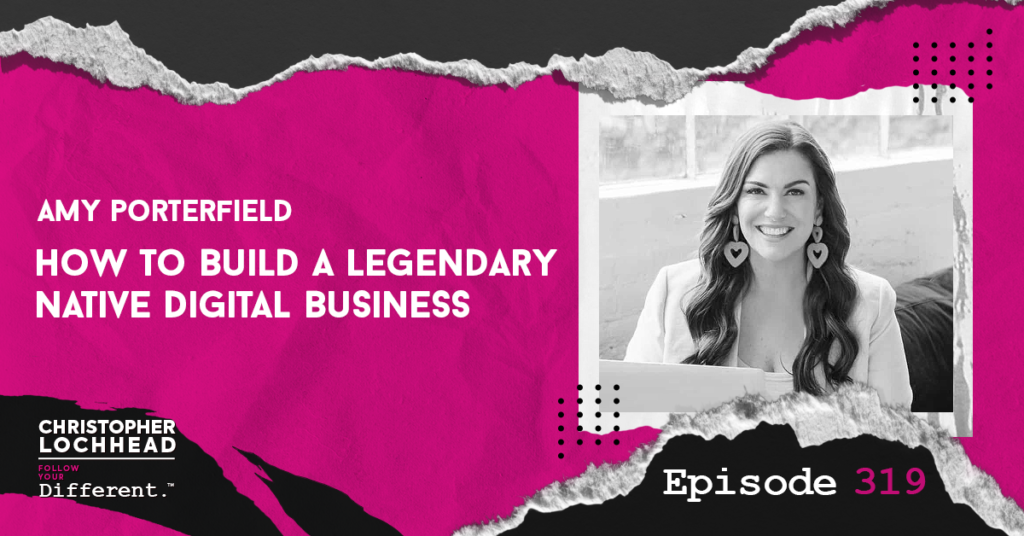
Podcast: Play in new window | Download (Duration: 54:28 — 37.4MB) | Embed
Subscribe: Apple Podcasts | Spotify | Pandora | RSS | More
Many people dream of being paid to create. That is, earning a living from both knowledge work, which is the application of existing knowledge to produce value, and creating net new knowledge, intellectual capital content, or what you can think of as creator capital, is simply cool. Our guest today is the Category Queen of teaching people to build highly scalable, highly profitable, native digital businesses, and specifically digital courses, content and communities, Amy Porterfield.
Amy Porterfield has a podcast called Online Marketing Made Easy, which is often the number one ranked marketing podcast in the world. and she also operates the leading digital course academy. Her book, Two Weeks Notice, find the courage to quit your job, make more money, work where you want, and change the world is a number one bestseller for a reason.
There are a lot of people who pay a lot of money to have the conversation with Amy that you’re about to hear. The future of businesses native digital in yourself will thank you for listening to this episode.
You’re listening to Christopher Lochhead: Follow Your Different. We are the real dialogue podcast for people with a different mind. So get your mind in a different place, and hey ho, let’s go.
Amy Porterfield, the Category Queen of Digital Community Online Marketing
We start the conversation with a brief background as to what Amy Porterfield does in the online business field. As Amy puts it, she teaches people how to start online businesses, specifically how to turn their knowledge, know-how, and skill set into a profitable digital course that they can launch over and over again.
And when it comes to digital resources, careers, or businesses that one can have access to, there’s a lot in the online sphere. Her courses teach you these options, so you can decide which ones you need to learn for your business, and which ones you might choose to delegate for efficiency.
Amy Porterfield on the magic of Digital Courses
Amy then highlights the benefits and advantages of digital courses. Both discuss from their POV the transformation that occurs when shifting from a product-focused marketing mindset to a teacher mindset. They highlight the scalability of digital courses, allowing creators and businesses to reach a larger audience and achieve greater freedom and financial success.
Amy emphasizes how digital courses can establish thought leaders and put individuals or companies on the map within their respective industries. Furthermore, digital courses help potential customers understand the value and power of a product, service, or brand, making it easier for them to buy in and become part of a community.
Teaching through digital courses is seen as a powerful strategy to educate and engage customers, ultimately leading to business growth.
The use of digital courses in a product-driven business
Amy then talks about the role of digital courses in educating people about innovative products or services and facilitating buy-in from potential customers. Amy highlights the value of digital courses in helping individuals understand the power and benefits of a business’s offerings, leading to increased interest and engagement.
Christopher adds that the more groundbreaking the product or service, the greater the need for education to bridge the gap between the new concept and the target audience. He mentions the importance of teaching and providing knowledge within digital courses to support the adoption of new ideas.
Digital courses are an effective medium for educating and empowering users and businesses alike. They enable businesses to demonstrate their expertise, build trust, and highlight the value they can offer. Businesses can establish themselves as thought leaders and attract a dedicated community of followers by teaching first and providing valuable content. Because they provide a structured and accessible format for learners to grasp new information, digital courses can be especially effective for introducing innovative or complex concepts. Overall, digital courses can be used by businesses to educate and engage their audiences, resulting in increased awareness, customer loyalty, and business growth.
To hear more from Amy and how to build a Legendary Native Digital business, download and listen to this episode.
Bio
Amy Porterfield
Amy Porterfield is an ex-corporate girl turned online marketing expert and CEO of her own multimillion-dollar business.
Through her best-selling courses and top-ranked marketing podcast Online Marketing Made Easy, Amy has helped hundreds of thousands of entrepreneurs to trade burnout for freedom, income, and impact and find professional autonomy, independence, and success far beyond what a corporate glass ceiling would traditionally allow.
She has been featured in Forbes, Fast Company, CNBC, Business Insider, Entrepreneur, and her company has twice been awarded the Inc. 5000 Award as one of the fastest-growing privately held companies in the U.S.
She runs her growing business from Nashville, Tennessee, where she lives with her husband, Hobie, and their Labradoodle, Scout. Learn more at AmyPorterfield.com.
Links
Connect with Amy Porterfield!
Amy’s Website | Instagram | Facebook | TikTok | LinkedIn
We hope you enjoyed this episode of Christopher Lochhead: Follow Your Different™! Christopher loves hearing from his listeners. Feel free to email him, connect on Facebook, Twitter, Instagram, and subscribe on iTunes!
176 How AI Changes Startups, Entrepreneurship & Venture Capital with Mike Maples Jr. of Floodgate
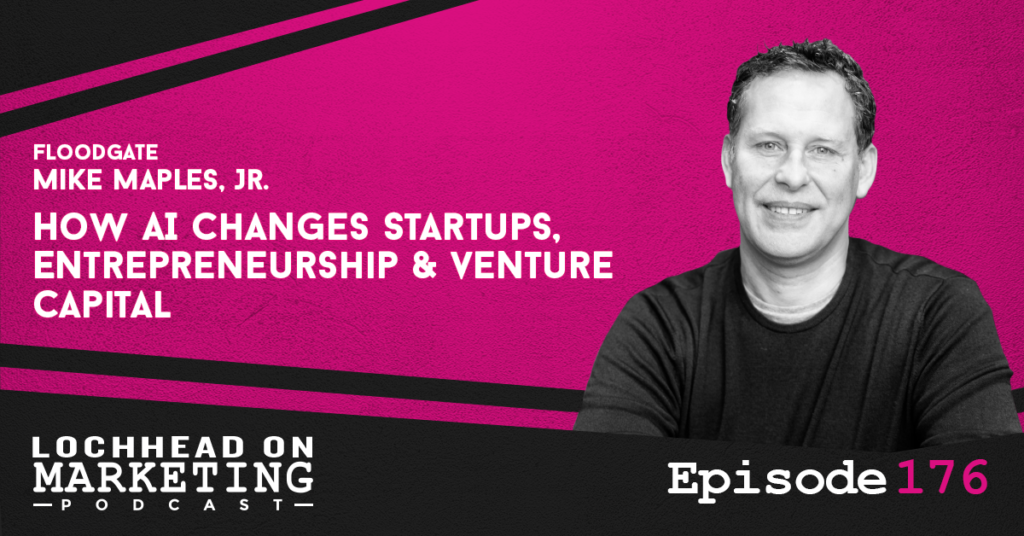
Podcast (lochheadonmarketing): Play in new window | Download (Duration: 39:09 — 26.9MB) | Embed
Subscribe: Apple Podcasts | Spotify | RSS | More
On this episode of Lochhead on Marketing, we have a dialogue with Mike Maples Jr. on how artificial intelligence is changing startups and venture capital.
Mike Maples Jr. is the co-founder of Floodgate, one of the highest profile early stage venture capitalists. He also has a podcast called Starting Greatness, and it is one of my absolute favorites.
By the end of it, we hope that you’ll gain a new way to think about both technical risk for startups and market risk. And why in an AI world, you must either be radically different or radically disintermediate something.
Welcome to Lochhead on Marketing. The number one charting marketing podcast for marketers, category designers, and entrepreneurs with a different mind.
Mike Maples Jr. on AI
We begin the discussion on the topic of challenges of making sense of the rapidly evolving field of AI.
Mike also talks about the traditional funding model of startups, where the primary focus was taking out technical risk, and how the LAMP stack, which commoditized what was once expensive, made it easier to start a startup. Mike notes that the nature of the LAMP stack changed what startups were funded for.
“What I like to say is that the LAMP stack was deflationary in terms of the cost of starting startup. And so what does that mean? It meant that what you were funding was different, because if Kevin Rose can start dig for $1,500, over a weekend, there’s no technical risks there. I mean, he hired a contractor to do it that he didn’t even know at the time.”
– Mike Maples Jr.
Who gets Product Market Fit first
The conversation then moves on to the changing dynamics of venture capital investment. The discussion continues with the notion that technical risk and market risk are inversely related. Solving a technically difficult problem that is valuable to society will create a market; if the problem is easy to solve technically, it will all come down to who achieves product-market fit first.
To add value to the business, Floodgate and YC have taken the approach of funding market risk takedown. As technology becomes more commoditized and innovations become more accessible, the person who creates something people want the quickest wins. This is why YC was so successful: it offered young people $100,000 to either take market risks or leave.
He also mentions that the traditional venture capital model may not be appropriate for all businesses and that deflationary factors such as content, code, and data may change the way businesses are built.
Mike Maples Jr. on AI and the future of Venture Capital
Mike Maples Jr. then returns to the topic of artificial intelligence and its implications for the future of venture capital.
Here, Mike emphasizes two ends of the risk spectrum: high technical risk and high market risk. On the one hand, some projects require large amounts of funding for mass computation in order to build massive models that have the potential to change humanity. On the other hand, AI is being used in a variety of fields, including content generation for marketing, customer service chatbots, and lead generation, resulting in a deflationary effect on content, code, and data.
According to Mike, some businesses may not require traditional venture capital funding and should instead focus on achieving $50 million in revenue with a small team and minimal funding. There is also speculation that the current billion-dollar funds may be providing the wrong incentives to these companies.
To hear more from Mike Maples Jr. and how AI can affect the future of startups and venture capital, download and listen to this episode.
Bio
Mike Maples Jr. is an entrepreneur turned venture capitalist.
He’s co-founder of Silicon Valley based, early-stage VC Floodgate. And the host of the popular “Starting Greatness” podcast.
Investments include Twitter, Lyft, Bazaarvoice, Sparefoot, Ayasdi, Xamarin, Doubledutch, Twitch.tv, Playdom, Chegg, Demandforce, Rappi, Smule, and Outreach.
Link
Connect with Mike Maples Jr.!
Floodgate | Twitter | LinkedIn | Starting Greatness Podcast
We hope you enjoyed this episode of Lochhead on Marketing™! Christopher loves hearing from his listeners. Feel free to email him, connect on Facebook, Twitter, Instagram, and subscribe on iTunes!
318 The Power of Questions with Jon Berghoff, Founder of XCHANGE Approach
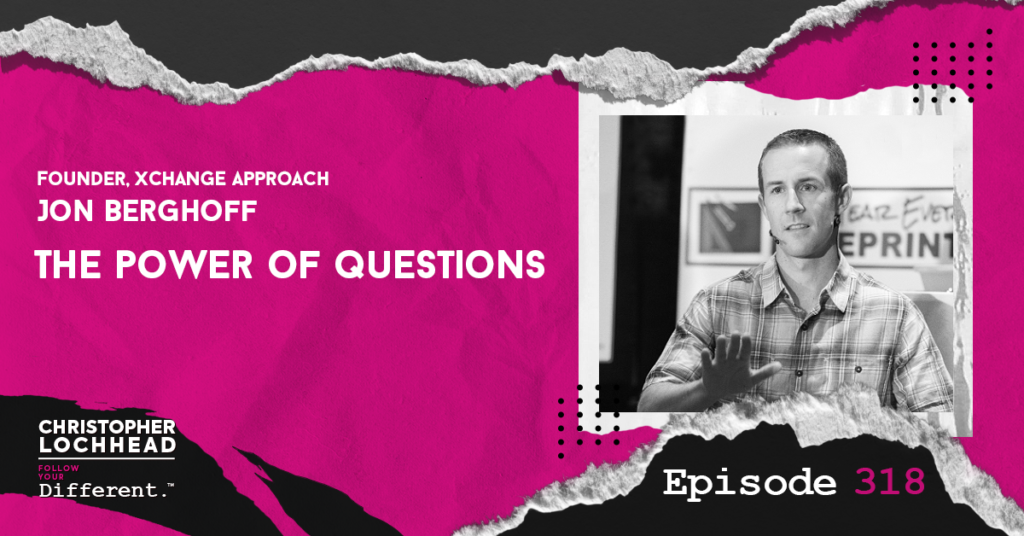
Podcast: Play in new window | Download (Duration: 47:54 — 32.9MB) | Embed
Subscribe: Apple Podcasts | Spotify | Pandora | RSS | More
Today, we are living in a world where access to all of the knowledge of humanity is getting easier, faster, and more accessible to all. This means that know what and how to ask questions to obtain the required answers have become a skill onto itself. On this episode, we have a dialogue with Jon Berghoff about the power of questions, and how to know if you’re asking the right questions.
Jon Berghoff is the founder of XCHANGE Approach, a company that delivers legendary group learning experiences designed to blow open exponential thinking, and exponential results.
Jon’s a living legend for a reason, and he’s a ton of fun. We promise you; your brain will thank you for listening to this dialogue today.
You’re listening to Christopher Lochhead: Follow Your Different. We are the real dialogue podcast for people with a different mind. So get your mind in a different place, and hey ho, let’s go.
Jon Berghoff on creating an experience where people feel safe
The conversation starts off with a question for Jon, particularly on how he could create successful digital events in a world where people don’t fully subscribe to them yet.
Jon shares that he drew his drive from his own experience back in high school, where he felt like he was left out and was disconnected for other people. In time, he realized that breaking through this disconnect is one of the important details in getting people excited for conversations, meetings, or on his case, digital events. Because they have a place where they feel safe and where they feel they belong.
Jon Berghoff on the role of questions
The next part of the dialogue focuses on the importance of asking the right questions and creating meaningful experiences in meetings and gatherings. Christopher recognizes that a company’s success is attributed to asking the right questions, listening, and creating a positive experience, and Jon is an expert at asking questions and creating a safe environment.
They then talk about the difficulty of adapting to a rapidly changing world and how it relates to ineffective meetings. Jon emphasizes the importance of designing meetings that address complex issues and move away from the notion that a few people have all the answers.
The Ego-centric design of meetings
The conversation then shifts to the ego-centric design in meetings and conversations. Christopher observes that some meetings have the feel of dictatorial ego-centric events in which a few people present their vision and have all the answers.
Jon agrees and explains that many meetings are unconsciously designed with an ego-centric approach, in which either a few people have all the answers or participants are more concerned with convincing each other of their own ideas.
They do, however, recognize the need to tap into collective intelligence and shift the paradigm to engage everyone’s thinking. Jon emphasizes the importance of questions in this process, stating that the world’s complexity requires less emphasis on having all the answers and more emphasis on asking the right questions. He refers to John Kelly’s view that future intelligence will be measured by the ability to ask the right questions rather than what one knows.
To hear more from Jon Berghoff and the power of questions in today’s knowledge-driven world, download and listen to this episode.
Bio
Jon Berghoff is the founder of the XCHANGE Approach, a scientific approach to unlocking collective wisdom in any group.
These are extraordinary times, which call for exponential conversations. Which is why innovative leaders have run to XCHANGE as the solution for bringing together companies, communities, customers in powerful ways.
Before COVID-19, XCHANGE was leaned on by companies like Facebook, BMW, Costco, to facilitate powerful, large-scale conversations… when the stakes were highest.
Since the COVID-19 outbreak, change agents of every type: coaches, consultants and thought leaders… are using XCHANGE to create connection, community and accelerated learning in every imaginable environment.
All of it digitally, of course.
Links
Connect with Jon Berghoff!
We hope you enjoyed this episode of Christopher Lochhead: Follow Your Different™! Christopher loves hearing from his listeners. Feel free to email him, connect on Facebook, Twitter, Instagram, and subscribe on iTunes!
317 Women’s Right To Orgasm: A Different Dialogue on Women’s Health with Dr. Christi Pramudji, Urologist-Gynecologist

Podcast: Play in new window | Download (Duration: 1:01:39 — 42.3MB) | Embed
Subscribe: Apple Podcasts | Spotify | Pandora | RSS | More
Women’s Health is a topic everyone cares about, and sexual health is an important part of living a legendary life. But it can also be a tough topic for both women and men to address. On this episode of Christopher Lochhead: Follow Your Different, we go deep into the topic of Women’s Health with our guest, Dr. Christi Pramudji.
Dr. Christi Pramudji, MD is a fascinating doctor because she followed her different to become one of the very few Urologist-Gynecologist. Dr. Christi is considered to be a true pioneer in Pelvic Health and Regeneration.
By the end of this episode, you’ll gain real insights into why Dr. Christi says orgasm is a right, how the female orgasm works, and what it takes for women to have them. She also presents a holistic approach, including some new recent medical interventions that help women have breakthroughs in their sexual health.
You’re listening to Christopher Lochhead: Follow Your Different. We are the real dialogue podcast for people with a different mind. So get your mind in a different place, and hey ho, let’s go.
Dr. Christi Pramudji on niching down
The conversation starts off with the question as to why Dr. Christi decided to niche down to being a urologist for women, rather than a more general practice.
Dr. Christi clarifies that she still has male clients from time to time, though looking at the overall clientele, 99.5% of it would be women. She explains that once clients found out that there was a female urologist, they all started flocking to her practice. Over time, she grew to love the role, and it became her specialty.
“When I got into practice, it immediately became female. As soon as women learned that there was a woman urologist, they wanted to come see me. And I kind of fought against it for a couple years. And then I decided that I really like this part of urology and I wanted to embrace it, and I just wanted to be really great at it.”
– Dr. Christi Pramudji
Why Women prefer female urologists
When asked why women tend to prefer female urologists over male urologists. Dr. Christi explains that many women feel more comfortable discussing private and intimate issues with a female doctor. Conditions like a leaky bladder can make women feel less feminine and embarrassed, leading them to prefer talking to a female urologist.
While most male urologists are easy to talk to and have a good sense of humor, women may still worry about feeling uncomfortable. Dr. Christi also mentions that a sense of humor and a warm, down-to-earth demeanor can help put patients at ease when discussing such personal matters, regardless of gender. They also share an example of a doctor with a unique bedside manner who is well-respected and successful in his field.
Dr. Christi Pramudji on the female orgasm
The topic then shifts to female orgasms and the numerous misconceptions about it. Dr. Christi explains that female orgasm is frequently portrayed in the media as easy to achieve during intercourse, which is unusual. Orgasm in women typically requires clitoral stimulation as well as full integration of the body and mind.
Dr. Christi also mentions how the lack of effective treatment options for female orgasm issues makes dealing with the issue difficult. She emphasizes that, unlike men, female orgasm is not required for procreation and is considered a sex bonus.
Christopher then asks if women can experience pleasure without orgasm, and Dr. Christi emphasizes that sex should be pleasurable even without orgasm. She does, however, clarify that the clitoris is the primary pleasure organ for women, and that most women require direct stimulation of the clitoris to experience intense pleasure.
To hear more from Dr. Christi Pramudji and other topics regarding women’s health, download and listen to this episode.
Bio
Dr. Christi Pramudji is a Urologist-Gynecologist whose expertise is unmatched as a true pioneer in pelvic health and regeneration and has helped thousands of women heal and get their fulfilling sex lives back.“ The clitoris is made for pleasure, and we must tap into that.
Every woman deserves an enjoyable sex life and the tremendously positive effects an orgasm has on the body, from increased mood and decreased stress levels to strengthening relationships,” says Pramudji.
Dr Pramudji advocates that women should be enjoying sex at all stages of their lives, and encourages them to take back their sex life, as this can have a profound effect on women’s overall health, wellness, and happiness.
While there are many ways to treat libido changes due to menopause and female sexual dysfunction post-menopause, the most exciting is a treatment called Cliovana, a gentle, non-invasive alternative to rejuvenation surgery, which Dr Pramudji describes as a game changer.
Links
Connect with Dr. Christi Pramudji!
ChristiMD Medical Group | LinkedIn | Youtube
We hope you enjoyed this episode of Christopher Lochhead: Follow Your Different™! Christopher loves hearing from his listeners. Feel free to email him, connect on Facebook, Twitter, Instagram, and subscribe on iTunes!
316 How AI Changes Startups, Entrepreneurship & Venture Capital with Mike Maples Jr. of Floodgate
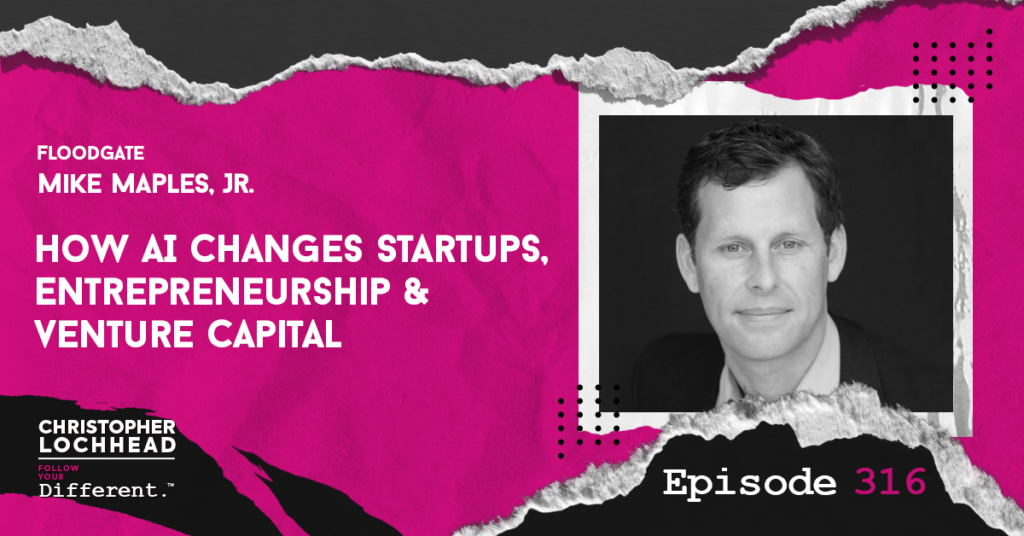
Podcast: Play in new window | Download (Duration: 39:15 — 27.0MB) | Embed
Subscribe: Apple Podcasts | Spotify | Pandora | RSS | More
On this episode of Christopher Lochhead: Follow Your Different, we have a dialogue with Mike Maples Jr. on how artificial intelligence is changing startups and venture capital.
Mike Maples Jr. is the co-founder of Floodgate, one of the highest profile early stage venture capitalists. He also has a podcast called Starting Greatness, and it is one of my absolute favorites.
By the end of it, we hope that you’ll gain a new way to think about both technical risk for startups and market risk. And why in an AI world, you must either be radically different or radically disintermediate something.
You’re listening to Christopher Lochhead: Follow Your Different. We are the real dialogue podcast for people with a different mind. So get your mind in a different place, and hey ho, let’s go.
Mike Maples Jr. on AI
We begin the discussion on the topic of challenges of making sense of the rapidly evolving field of AI.
Mike also talks about the traditional funding model of startups, where the primary focus was taking out technical risk, and how the LAMP stack, which commoditized what was once expensive, made it easier to start a startup. Mike notes that the nature of the LAMP stack changed what startups were funded for.
“What I like to say is that the LAMP stack was deflationary in terms of the cost of starting startup. And so what does that mean? It meant that what you were funding was different, because if Kevin Rose can start dig for $1,500, over a weekend, there’s no technical risks there. I mean, he hired a contractor to do it that he didn’t even know at the time.”
– Mike Maples Jr.
Who gets Product Market Fit first
The conversation then moves on to the changing dynamics of venture capital investment. The discussion continues with the notion that technical risk and market risk are inversely related. Solving a technically difficult problem that is valuable to society will create a market; if the problem is easy to solve technically, it will all come down to who achieves product-market fit first.
To add value to the business, Floodgate and YC have taken the approach of funding market risk takedown. As technology becomes more commoditized and innovations become more accessible, the person who creates something people want the quickest wins. This is why YC was so successful: it offered young people $100,000 to either take market risks or leave.
He also mentions that the traditional venture capital model may not be appropriate for all businesses and that deflationary factors such as content, code, and data may change the way businesses are built.
Mike Maples Jr. on AI and the future of Venture Capital
Mike Maples Jr. then returns to the topic of artificial intelligence and its implications for the future of venture capital.
Here, Mike emphasizes two ends of the risk spectrum: high technical risk and high market risk. On the one hand, some projects require large amounts of funding for mass computation in order to build massive models that have the potential to change humanity. On the other hand, AI is being used in a variety of fields, including content generation for marketing, customer service chatbots, and lead generation, resulting in a deflationary effect on content, code, and data.
According to Mike, some businesses may not require traditional venture capital funding and should instead focus on achieving $50 million in revenue with a small team and minimal funding. There is also speculation that the current billion-dollar funds may be providing the wrong incentives to these companies.
To hear more from Mike Maples Jr. and how AI can affect the future of startups and venture capital, download and listen to this episode.
Bio
Mike Maples Jr. is an entrepreneur turned venture capitalist.
He’s co-founder of Silicon Valley based, early-stage VC Floodgate. And the host of the popular “Starting Greatness” podcast.
Investments include Twitter, Lyft, Bazaarvoice, Sparefoot, Ayasdi, Xamarin, Doubledutch, Twitch.tv, Playdom, Chegg, Demandforce, Rappi, Smule, and Outreach.
Link
Connect with Mike Maples Jr.!
Floodgate | Twitter | LinkedIn | Starting Greatness Podcast
We hope you enjoyed this episode of Christopher Lochhead: Follow Your Different™! Christopher loves hearing from his listeners. Feel free to email him, connect on Facebook, Twitter, Instagram, and subscribe on iTunes!
315 Mastering Crisis with Liz Hoffman, Bestselling Author of Crash Landing: The Inside Story of How The World’s Biggest Companies Survived an Economy On The Brink
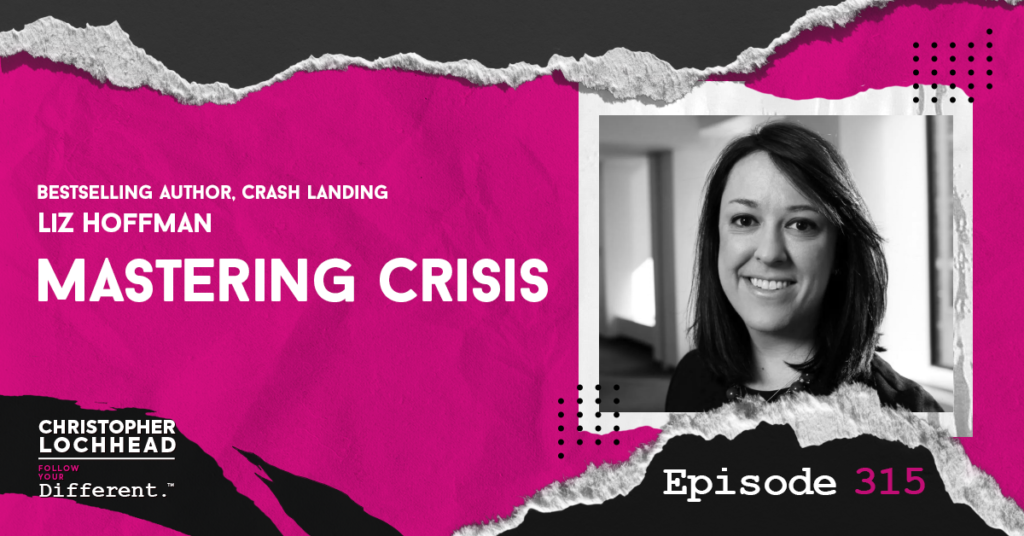
Podcast: Play in new window | Download (Duration: 1:23:46 — 57.5MB) | Embed
Subscribe: Apple Podcasts | Spotify | Pandora | RSS | More
Over the last three years or so, we’ve all been through one of the craziest most challenging times in modern history. On today’s episode, we have a conversation with Liz Hoffman on how we can take stock of what just happened, and how we can master ourselves during a time of Crisis.
Liz Hoffman is a legendary author and journalist. She used to be a senior reporter at The Wall Street Journal, and now she’s a business and finance editor at the new startup called Semafor.com.
She’s got a riveting new book out that I really enjoyed, called Crash Landing: The Inside Story of how the world’s biggest companies survived an economy on the brink. We’ll discuss more about this new book and much more in today’s Follow Your Different, so stay tuned.
You’re listening to Christopher Lochhead: Follow Your Different. We are the real dialogue podcast for people with a different mind. So get your mind in a different place, and hey ho, let’s go.
Liz Hoffman on the early days of the pandemic, and how we are today
Liz and Christopher discuss the emotional impact of the pandemic’s early days, which they regard as a global trauma. She then talks about how the emotional pitch of those days helped her set the emotional tone of her book’s characters.
Christopher reflects on the dramatic changes in the world since then, as well as his sense of loss for lost time and loved ones. Liz agrees and mentions a recent article on the pandemic’s delayed reckoning with global trauma. They then talk about the bumpy re-entry into the world and the pandemic’s lingering effects, of whether we are post-pandemic or not.
Liz Hoffman on the ending that never came
Liz and Chris discussed how they, like many others, had hoped for a clear endpoint to the COVID-19 pandemic, but that it had remained elusive.
And for Liz, there was an added layer of it as a reporter, looking for a conclusion to her work, but it never came. Christopher mentioned how both parties were hoping for a Hollywood-style ending, but the emergence of the Omicron variant dashed those hopes.
Liz Hoffman believes that, as humans, people prefer clarity and closure, but the pandemic has been a long-term experience that defies easy categorization. The pacing of Liz’s pandemic book reflects this, as it begins with a frenzy before settling into a long and uncertain funk.
What legendary leaders do in times of crisis
Christopher then asks Liz for insight on how leaders can rise to the occasion rather than crumble under pressure.
Liz believes that making a large number of decisions quickly and efficiently, without over-analyzing, can be beneficial. She cites the CEO of Hilton, who pulled their credit lines from banks in early March and received $2 billion to get them through the crisis.
Liz emphasizes the importance of making decisions early and anticipating what will happen next, rather than getting bogged down in lengthy decision-making processes. She also points out that leaders should never run a multinational corporation on instinct alone, yet there is frequently unnecessary “process fat” in corporate decision-making that can be trimmed off.
To hear more from Liz Hoffman and how to master yourself in times of crisis, download and listen to this episode.
Bio
Liz Hoffman is the business and finance editor at Semafor.
Previously, she was a senior reporter at The Wall Street Journal, where she covered financial markets, corporate dealmaking, and the machinations of Wall Street.
A native of central Pennsylvania, Hoffman graduated from Tufts University and the Medill School of Journalism at Northwestern University.
She lives in Brooklyn, New York.
Links
Connect with Liz Hoffman!
Semafor | Twitter | LinkedIn | Crash Landing
We hope you enjoyed this episode of Christopher Lochhead: Follow Your Different™! Christopher loves hearing from his listeners. Feel free to email him, connect on Facebook, Twitter, Instagram, and subscribe on iTunes!
175 Elon Musk’s New Category Design For Twitter: Will it work?
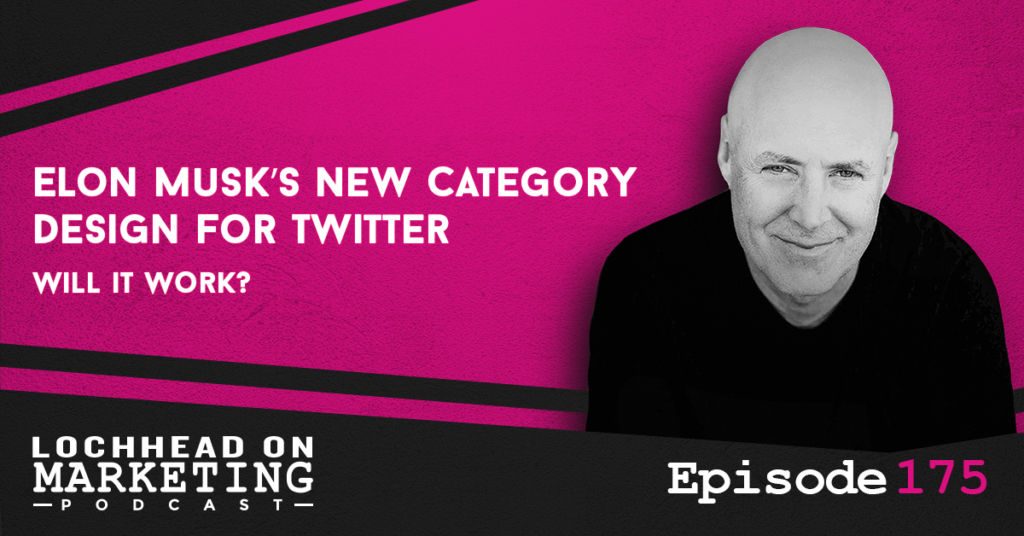
Podcast (lochheadonmarketing): Play in new window | Download (Duration: 15:47 — 10.8MB) | Embed
Subscribe: Apple Podcasts | Spotify | RSS | More
On this episode of Lochhead on Marketing, myself and Eddie Yun, co-founder & co-creator of Category Pirates, tackle what’s going on with what Elon Musk is now doing at Twitter; specifically, the move to charging people for their Validation Verification– once coveted, now purchasable – Blue Checkmarks.
This is part of a new thing we’re doing with our Category Pirates newsletter called Pirate Perspectives. So if you are interested and haven’t subscribed to Category Pirates yet, now’s the best time to check it out.
Welcome to Lochhead on Marketing. The number one charting marketing podcast for marketers, category designers, and entrepreneurs with a different mind.
Twitter removes the Blue Check. Kinda.
The conversation starts with Christopher and Eddie Yoon discussing Twitter’s recent decision to remove Legacy Blue Checkmarks and only allowing verified accounts for those who pay. Eddie argues that this move is a step towards aligning Twitter’s incentives with its users by making them pay for the service rather than monetizing their data through an advertising model. However, he suggests that Twitter could offer a tiered pricing structure to accommodate different budgets.
The two acknowledge that this move has caused a lot of controversy, with some users upset about losing their Legacy Blue checkmarks, while some are given Blue checkmarks even though they didn’t ask for one. Christopher mentions that Elon Musk paid for verified accounts for Stephen King, LeBron James, and others, and they are angry about the change given their prior stance about it.
Elon Musk and the missed opportunity with repurposing the blue checkmark
Christopher and Eddie then talk about the recent decision by Twitter to remove the blue checkmark verification for some users. Christopher mentions that he appreciates the verification process before because it helps him identify real people on the platform.
They also discuss the success of OpenAI’s GPT chat and the importance of delivering a valuable user experience. Eddie agrees and mentions that incentivizing creators can improve the overall ecosystem by improving content and reducing fraud. They agree that Elon Musk and Twitter missed an opportunity to position the repurposing of blue checkmarks as an improvement to the user experience rather than a takeaway.
To hear more about these category pirates’ hot takes on what is happening to Twitter and the social media space, download and listen to this episode.
Bio
Christopher Lochhead is a #1 Apple podcaster and #1 Amazon bestselling co-author of books: Niche Down and Play Bigger.
He has been an advisor to over 50 venture-backed startups; a former three-time Silicon Valley public company CMO and an entrepreneur.
Furthermore, he has been called “one of the best minds in marketing” by The Marketing Journal, a “Human Exclamation Point” by Fast Company, a “quasar” by NBA legend Bill Walton and “off-putting to some” by The Economist.
In addition, he served as a chief marketing officer of software juggernaut Mercury Interactive. Hewlett-Packard acquired the company in 2006, for $4.5 billion.
He also co-founded the marketing consulting firm LOCHHEAD; the founding CMO of Internet consulting firm Scient, and served as head of marketing at the CRM software firm Vantive.
Don’t forget to grab a copy (or gift!) of one of our best-selling books:
Snow Leopard: How Legendary Writers Create A Category Of One
The Category Design Toolkit: Beyond Marketing: 15 Frameworks For Creating & Dominating Your Niche
A Marketer’s Guide To Category Design: How To Escape The “Better” Trap, Dam The Demand, And Launch A Lightning Strike Strategy
We hope you enjoyed this episode of Lochhead on Marketing™! Christopher loves hearing from his listeners. Feel free to email him, connect on Facebook, Twitter, Instagram, and subscribe on iTunes!

